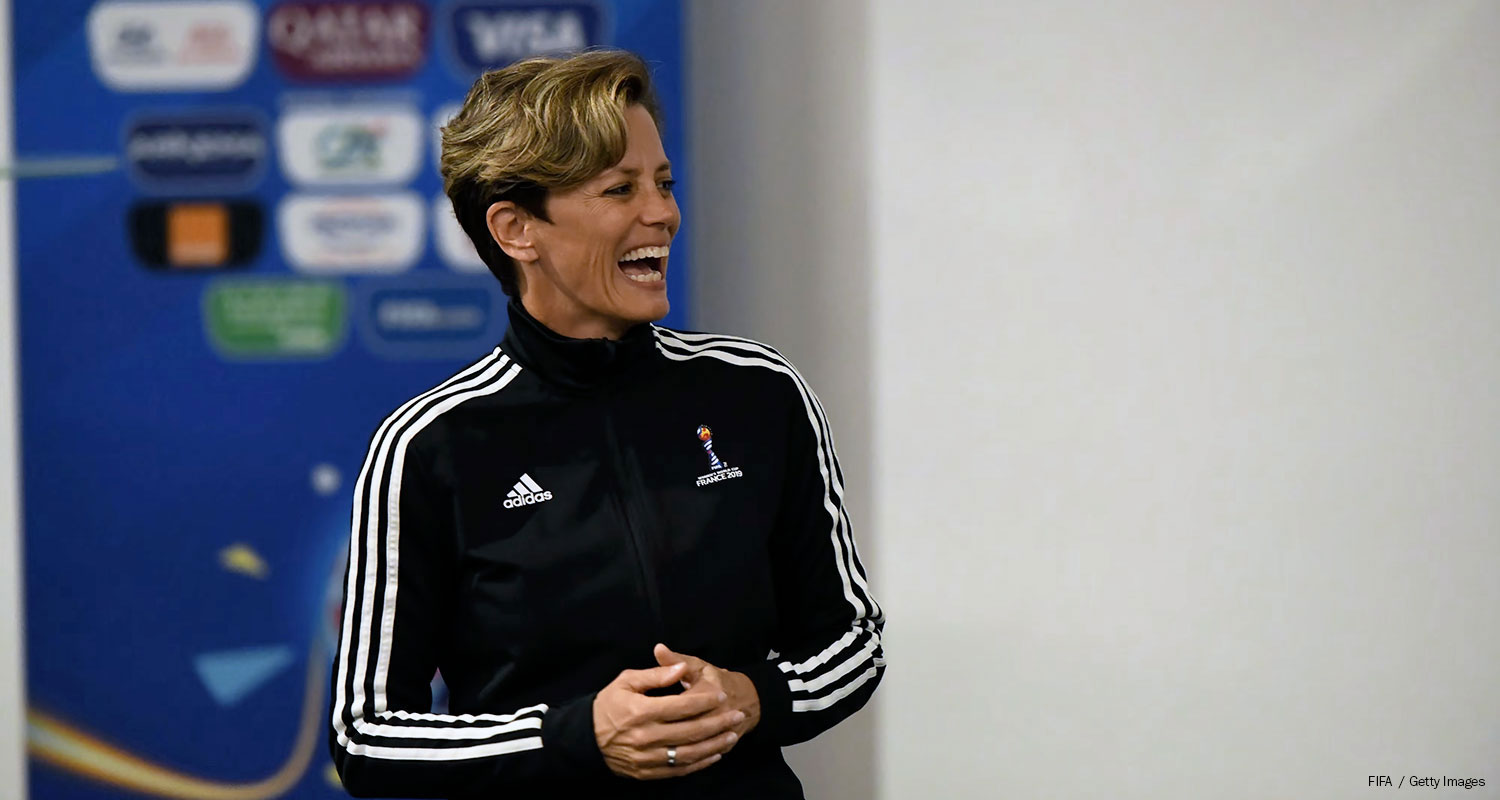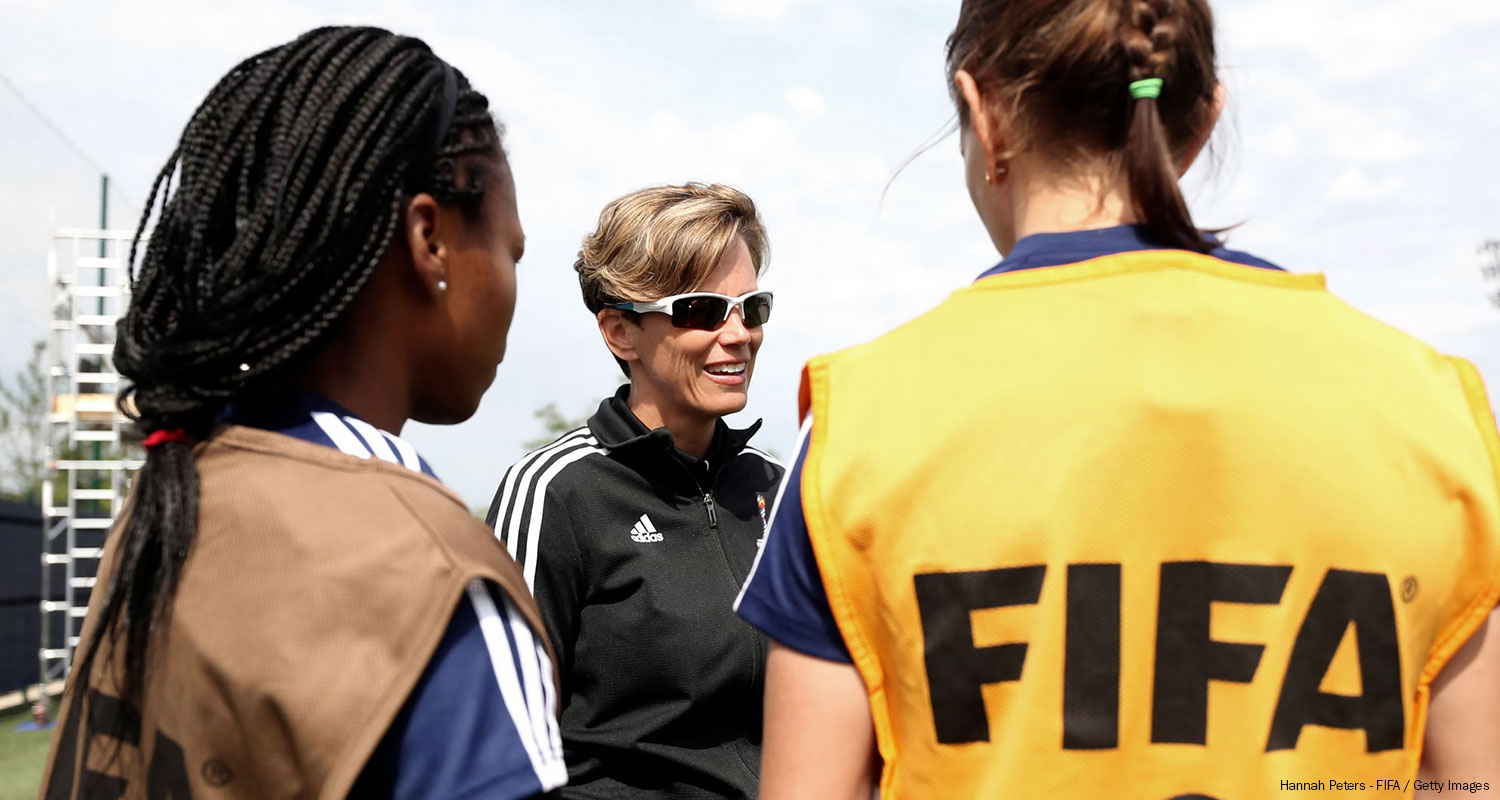Ahead of Euro 2005, UEFA decided that bar hosts England, none of the officials selected for the tournament should be from any of the other seven nations taking part in the tournament, largely to avoid conflict, but to help further the development of women’s officials in nations outside the elite at the time.
With Wendy Toms and Amy Rayner selected as England’s representatives, UEFA found there was a lack of top-class officials from nations outside those participating and had to make what was a fairly unprecedented move in drafting over top United States referee Kari Seitz for the tournament.
At the time, Seitz was one of the world’s top officials and still to this day one of only a few non-European officials to referee in a UEFA tournament, having previously officiated at the 1999 and 2003 World Cups, as well as the 2004 Olympic Games.
“It actually says quite a bit about the development of women’s football as to why I was there at the time,” Seitz recalled. “UEFA made a decision they didn’t want to include referees who had a nation. It was a strategy I think to avoid any potential controversy, but if you consider most of the top referees come from the top nations and most of the top nations were at the tournament, that doesn’t leave you many choices.”
Drafted into the Ranks
Seitz was drafted in alongside the likes of Rayner, Toms, Czech referee Dagmar Damková, and Slovakia’s Alexandra Ihringová, but Seitz had at least been in the same boat before after being selected to officiate in the Asia Women’s Championship in the Philippines in 1999.
“I’m not exactly sure how they [UEFA] made the connection, I presume they just contacted U.S. Soccer, but I felt very fortunate to be selected. The misfortune of some referees who probably should have been there worked out for me.”
Seitz would go on to officiate one of the semifinals between Norway and Finland, a game she later recalls as one of the “best of her career,” but she already had plenty of experience officiating the top players, with many European stars featuring in the domestic U.S. league — Women’s United Soccer Association (WUSA) — at the time.
“I was refereeing the best players on a weekly basis,” she said. “I’d had experiences of World Cups in the past, so I knew the top European teams quite well and the players too. Not all of them, of course, but most of them I’d refereed at some point.
“For me, it was coming to England for the first time, which was the biggest change, rather than the job. The UEFA training and everything was different, but the games for me were the same. Some of the players were playing in the U.S., so that was fine, and I have to say both UEFA and the FA were ahead of everything.
“I was absorbed immediately,” she added. “I wasn’t an outsider, most referees come in and do the group stages and then get sent home, but to do a semifinal was an amazing part of my career and it was great to see how well organized UEFA was compared to CONCACAF at the time. I made friends for life there — officials, instructors, the professionalism was a big step up from what I’d experienced in the U.S.”
The semifinal was one of three Seitz did throughout the tournament, with Germany versus Italy in Group B and she also had the honor of being awarded the opening game between Sweden and Denmark in Blackpool, which took place just hours before 29,000 fans crowded into the City of Manchester Stadium to watch hosts England face Finland.
A more modest 3,231 were in attendance on the west coast to watch a low-key 1–1 draw, and it’s no huge surprise that 17 years on, it is the semifinal thriller that sticks in Seitz’s mind, rather than the opener.
“I don’t remember much about the game, but I remember going to Blackpool, but never got to see what Blackpool was all about! We arrived in the evening and left at the dark of night after the game.
“The semifinal, it was a rugby stadium, the stadiums are so different in England compared to the U.S. I did think it was strange that in a football nation, we were playing in a rugby stadium. I didn’t really understand how much women weren’t supported until I came to England in comparison to the U.S. I think at the time, USA was ahead in that respect, soccer was soccer, I struggled to understand why there were games in a rugby stadium.”
Indeed, the whole tournament was confined to the northwest of the country, with what is now better known as the Etihad Stadium the only Premier League ground in use.
Other venues aside from Blackpool included Warrington’s rugby stadium, plus the homes of Blackburn Rovers and Preston North End, with the former’s Ewood Park hosting the final.
Progress
It will be different this time around, with Manchester United’s Old Trafford and the national stadium at Wembley bookending either side of the tournament, and while she has plenty of praise for UEFA, Seitz admits it was an eye-opener to see where the English game was at.
“The only downside was I saw how far behind England was in supporting women’s football, specifically at that time, but I’m so excited now for how that has changed. I knew it would come, it was just how long would it take?”
With England out in the group stages and Germany comfortably into another final after beating Finland 4–1 in the first semifinal, it was all eyes on Sweden and Norway in Warrington for the right for a place in the final, with Seitz the woman in the middle.
“That occasion was phenomenal,” she recalled. “It was high-paced, back and forth, such a well-played football match. Two teams who knew each other so well.”
Two of Europe’s finest players took center stage, with Norway’s Solveig Gulbrandsen opening the scoring, before Sweden’s icon Hanna Ljungberg responded.
Sixteen-year-old Isabell Herlovsen headed Norway back in front before Ljungberg’s 89th-minute strike sent the game to extra time.
“They changed the laws of the game that year to make it an automatic booking if a player pulled their shirt over the head,” Seitz recalled. “I remember in that game, somebody did that. I’m saying to my assistant, ‘Did I just see that?’ because you don’t see it very often. Brandi [Chastain] did it, but the game was over then.
“I just remember going up to her thinking, ‘Why did you do that? This is a stupid yellow card, but I have no choice.’ It went to extra time and I didn’t want the game to end, it was phenomenal. It was a clean game, brilliant football, and those memories are really special. To be inside the pitch in a top-level match, that’s what you live for, and if you don’t remember me being there, even better, because it means I didn’t have to interfere. It was just a super match.”
It was Gulbrandsen on the end of Seitz’s yellow card, and she was careful not to repeat the feat when she struck her second and the winning goal deep into extra time, which would have meant she’d miss the final.
Rare Insight
It’s a rare chance to quiz a referee on the intricacies of the job, given referees in the job don’t do media interviews, and even interviews with past officials are few and far between.
Given the differences between the European game and the American game, how much work goes into preparing for a tournament where as an official, you are very much heading somewhat into the unknown?
“We do study the teams and the players,” she said. “Their tendencies, how they play, it’s important to know. If you only react all the time, you are behind the play, you can’t anticipate what is going to happen next or where to be on the field in order to make a decision.
“If you referee a team that is good at counterattacks, that changes how I referee because you have to be ready to change direction and sprint quickly. All these things influence how we officiate, because if we can’t understand how they play or the level of contact they can accept, things like that. A team in South America might be different to a team in Europe and you have to respect that.”
Seitz is now the Head of Refereeing in the women’s game at FIFA and will be back in England this month to observe officials in her role in choosing which of them get to go to the World Cup in Australia and New Zealand next year as UEFA representatives.
With officiating moving on with the introduction of technology, Seitz is open about how FIFA tries to work with coaches and players in order to benefit each other.
“You have to really understand the teams and players, and here at FIFA we bring coaches in and they do analysis on the teams and they prepare the referees for what might happen, with the knowledge they’ll need to be flexible.”
When Seitz does return later this month, she will return with the memories of what she describes as one of the most special times of her career having had the honor of being asked to come and represent CONCACAFf at another confederation’s headline tournament.
There’s also one memory in particular that stands out, and a piece of the tournament she still has to this day.
“It was one of the highlights of my career, no doubt,” she said. “I went to four World Cups, three Olympics, and the Euros was a huge highlight. USA has amazing women’s football, but the history of football is huge in Europe. I continue to be friends with people from there. There was a man called Joe Guest, he was the referee liaison officer in England, he moved on to be the general secretary for referees in Canada.
“I remember one particular moment still to this day. UEFA has always been known as a well-run organization; in CONCACAF we had a very different budget. We’d never received anything that said CONCACAF on it and I remember when we got the tracksuits, I had one which said UEFA on the back. I wanted a picture with everyone to show I had a tracksuit with the confederation’s name on it — I made all the girls pose with me! It was just a message of being part of something.”
Seitz also knows she’s coming back to a nation that will embrace the tournament and year on year is embracing and investing in the women’s game to a completely different level to the one she experienced 17 years ago.
“I can’t wait to see the difference, it should be night and day. The quality of football was always good, now it’s about the spectators and the stadiums. It’s going to be a completely different event and that’s what it should be, not where we were.”


